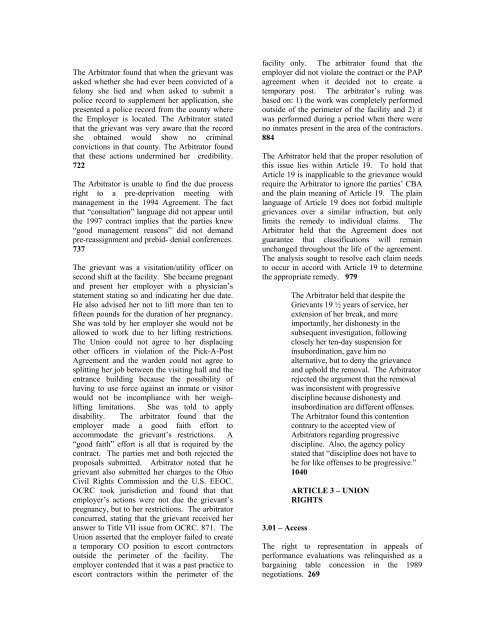by Contract Number (PDF) - OCSEA
by Contract Number (PDF) - OCSEA
by Contract Number (PDF) - OCSEA
You also want an ePaper? Increase the reach of your titles
YUMPU automatically turns print PDFs into web optimized ePapers that Google loves.
The Arbitrator found that when the grievant was<br />
asked whether she had ever been convicted of a<br />
felony she lied and when asked to submit a<br />
police record to supplement her application, she<br />
presented a police record from the county where<br />
the Employer is located. The Arbitrator stated<br />
that the grievant was very aware that the record<br />
she obtained would show no criminal<br />
convictions in that county. The Arbitrator found<br />
that these actions undermined her credibility.<br />
722<br />
The Arbitrator is unable to find the due process<br />
right to a pre-deprivation meeting with<br />
management in the 1994 Agreement. The fact<br />
that “consultation” language did not appear until<br />
the 1997 contract implies that the parties knew<br />
“good management reasons” did not demand<br />
pre-reassignment and prebid- denial conferences.<br />
737<br />
The grievant was a visitation/utility officer on<br />
second shift at the facility. She became pregnant<br />
and present her employer with a physician’s<br />
statement stating so and indicating her due date.<br />
He also advised her not to lift more than ten to<br />
fifteen pounds for the duration of her pregnancy.<br />
She was told <strong>by</strong> her employer she would not be<br />
allowed to work due to her lifting restrictions.<br />
The Union could not agree to her displacing<br />
other officers in violation of the Pick-A-Post<br />
Agreement and the warden could not agree to<br />
splitting her job between the visiting hall and the<br />
entrance building because the possibility of<br />
having to use force against an inmate or visitor<br />
would not be incompliance with her weighlifting<br />
limitations. She was told to apply<br />
disability. The arbitrator found that the<br />
employer made a good faith effort to<br />
accommodate the grievant’s restrictions. A<br />
“good faith” effort is all that is required <strong>by</strong> the<br />
contract. The parties met and both rejected the<br />
proposals submitted. Arbitrator noted that he<br />
grievant also submitted her charges to the Ohio<br />
Civil Rights Commission and the U.S. EEOC.<br />
OCRC took jurisdiction and found that that<br />
employer’s actions were not due the grievant’s<br />
pregnancy, but to her restrictions. The arbitrator<br />
concurred, stating that the grievant received her<br />
answer to Title VII issue from OCRC. 871. The<br />
Union asserted that the employer failed to create<br />
a temporary CO position to escort contractors<br />
outside the perimeter of the facility. The<br />
employer contended that it was a past practice to<br />
escort contractors within the perimeter of the<br />
facility only. The arbitrator found that the<br />
employer did not violate the contract or the PAP<br />
agreement when it decided not to create a<br />
temporary post. The arbitrator’s ruling was<br />
based on: 1) the work was completely performed<br />
outside of the perimeter of the facility and 2) it<br />
was performed during a period when there were<br />
no inmates present in the area of the contractors.<br />
884<br />
The Arbitrator held that the proper resolution of<br />
this issue lies within Article 19. To hold that<br />
Article 19 is inapplicable to the grievance would<br />
require the Arbitrator to ignore the parties’ CBA<br />
and the plain meaning of Article 19. The plain<br />
language of Article 19 does not forbid multiple<br />
grievances over a similar infraction, but only<br />
limits the remedy to individual claims. The<br />
Arbitrator held that the Agreement does not<br />
guarantee that classifications will remain<br />
unchanged throughout the life of the agreement.<br />
The analysis sought to resolve each claim needs<br />
to occur in accord with Article 19 to determine<br />
the appropriate remedy. 979<br />
3.01 – Access<br />
The Arbitrator held that despite the<br />
Grievants 19 ½ years of service, her<br />
extension of her break, and more<br />
importantly, her dishonesty in the<br />
subsequent investigation, following<br />
closely her ten-day suspension for<br />
insubordination, gave him no<br />
alternative, but to deny the grievance<br />
and uphold the removal. The Arbitrator<br />
rejected the argument that the removal<br />
was inconsistent with progressive<br />
discipline because dishonesty and<br />
insubordination are different offenses.<br />
The Arbitrator found this contention<br />
contrary to the accepted view of<br />
Arbitrators regarding progressive<br />
discipline. Also, the agency policy<br />
stated that “discipline does not have to<br />
be for like offenses to be progressive.”<br />
1040<br />
ARTICLE 3 – UNION<br />
RIGHTS<br />
The right to representation in appeals of<br />
performance evaluations was relinquished as a<br />
bargaining table concession in the 1989<br />
negotiations. 269
















